Latest Developments in Israeli-Palestinian Conflict
18:54 GMT 07.04.2023 (Updated: 19:04 GMT 07.04.2023)
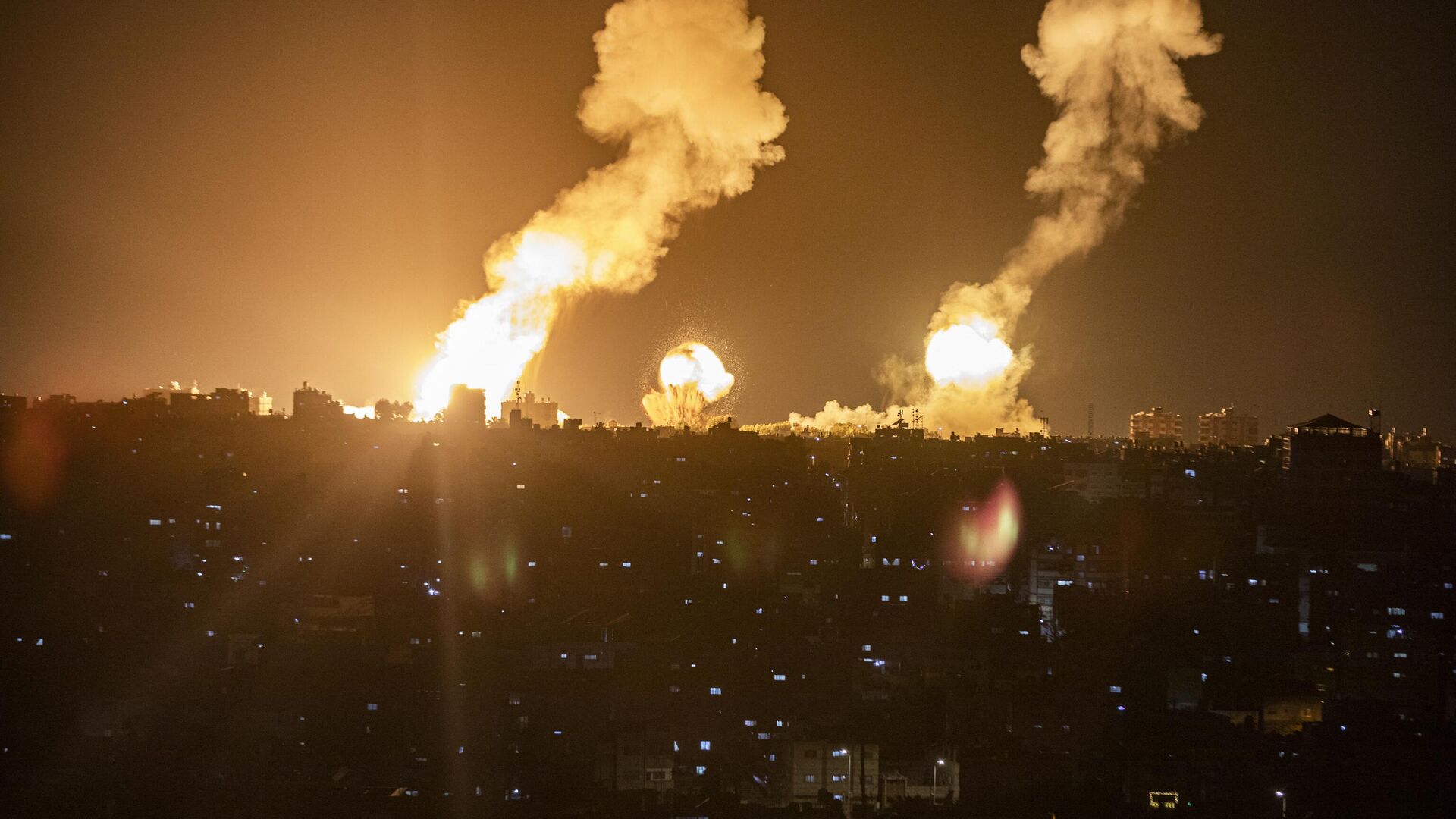
© AFP 2023 / -
Subscribe
The prospects of a peaceful resolution of the Israeli-Palestinian conflict and improving relations between Israel and Lebanon in the near future have apparently gone down the drain amid the latest escalation of violence in the region.
Things took a turn for the worse earlier this week when Israeli security forces raided the Al-Aqsa Mosque – one of the holiest places in Islam, located on the Temple Mount in Jerusalem – where thousands of Muslim worshippers were performing an overnight prayer.
The Israeli police ended up arresting hundreds of Palestinian worshippers, alleging that the latter were "violently barricading" themselves inside the religious sanctuary.
The raid, conducted amid the Islamic holy month of Ramadan, prompted a rocket barrage fired from Lebanon into northern Israel, which Israeli authorities blamed on Hamas.
The Israel Defense Forces (IDF) retaliated with airstrikes against targets in southern Lebanon and Gaza on Friday, claiming that they were attacking Hamas assets, while Palestinian militants in Gaza responded by launching rockets at Israeli territory.
So what are these rising regional tensions all about and will there be further escalation? Sputnik explores.
What are the Latest Developments?
The IDF’s Home Front Command has lifted restrictions on residents of towns located close to the border with the Gaza Strip. These include the southern city of Sderot and the nearby towns of Ibim and Nir Am, according to Israeli media.
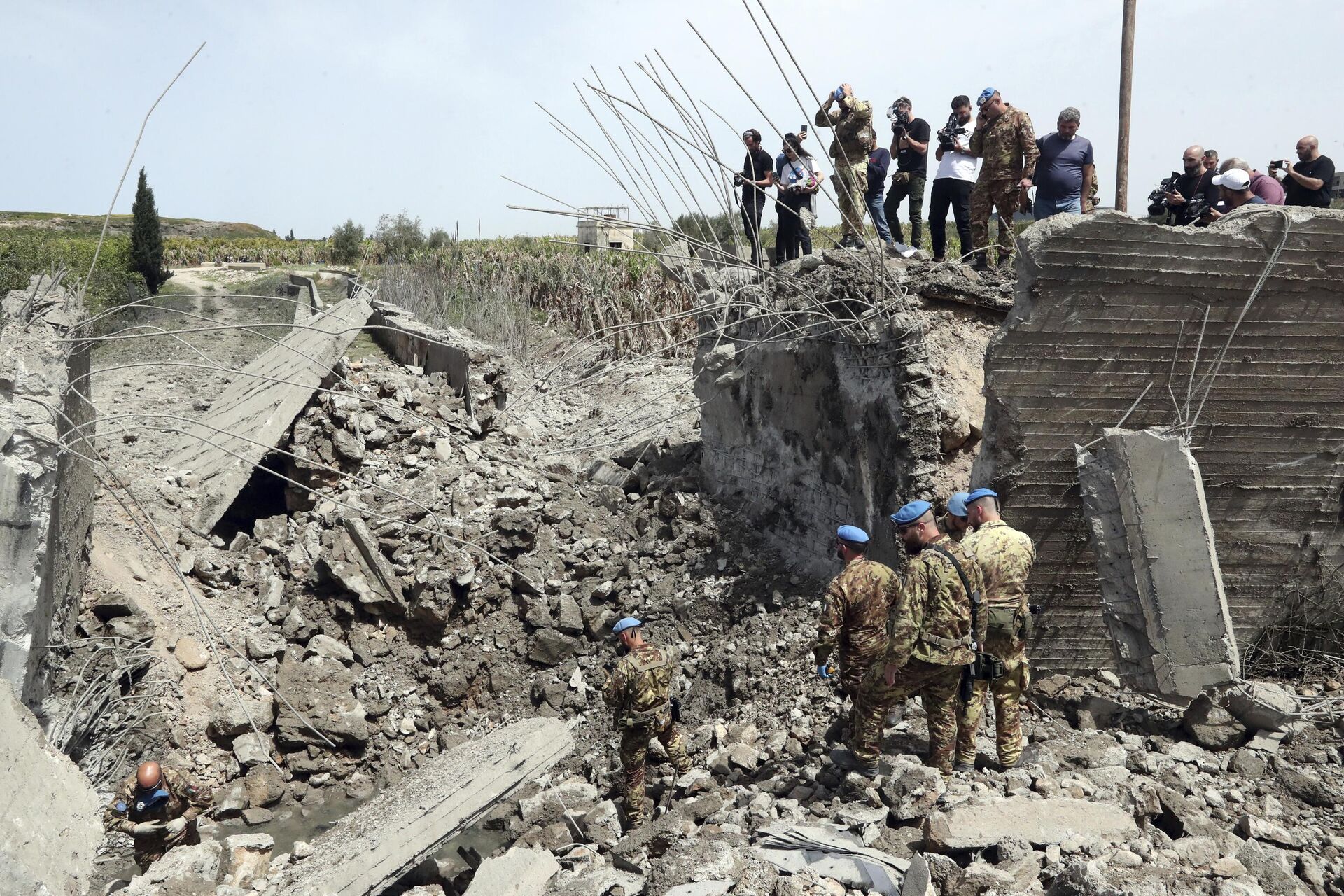
Italian U.N. peacekeeper soldiers inspect a small bridge that was destroyed by an Israeli airstrike, in Maaliya village, south Lebanon, Friday, April 7, 2023
© AP Photo / Mohammed Zaatari
The developments came hours after the IDF instructed residents to remain close to bomb shelters, anticipating further rocket attacks from Gaza. Several media outlets have quoted unnamed sources as saying that unless more projectiles are launched at Israel, the current round of hostilities might be over.
A spokesman for the IDF has also said that the Israeli operation was over for the moment, stating that “nobody wants an escalation right now."
"Quiet will be answered with quiet, at this stage I think, at least in the coming hours,” he added.
Tel Aviv's Stance on Missile Exchange
The Israeli military says it hit a number of targets belonging to Hamas in southern Lebanon. According to the IDF, they attacked “infrastructure targets” and other sites of what Tel Aviv sees as a terror group.
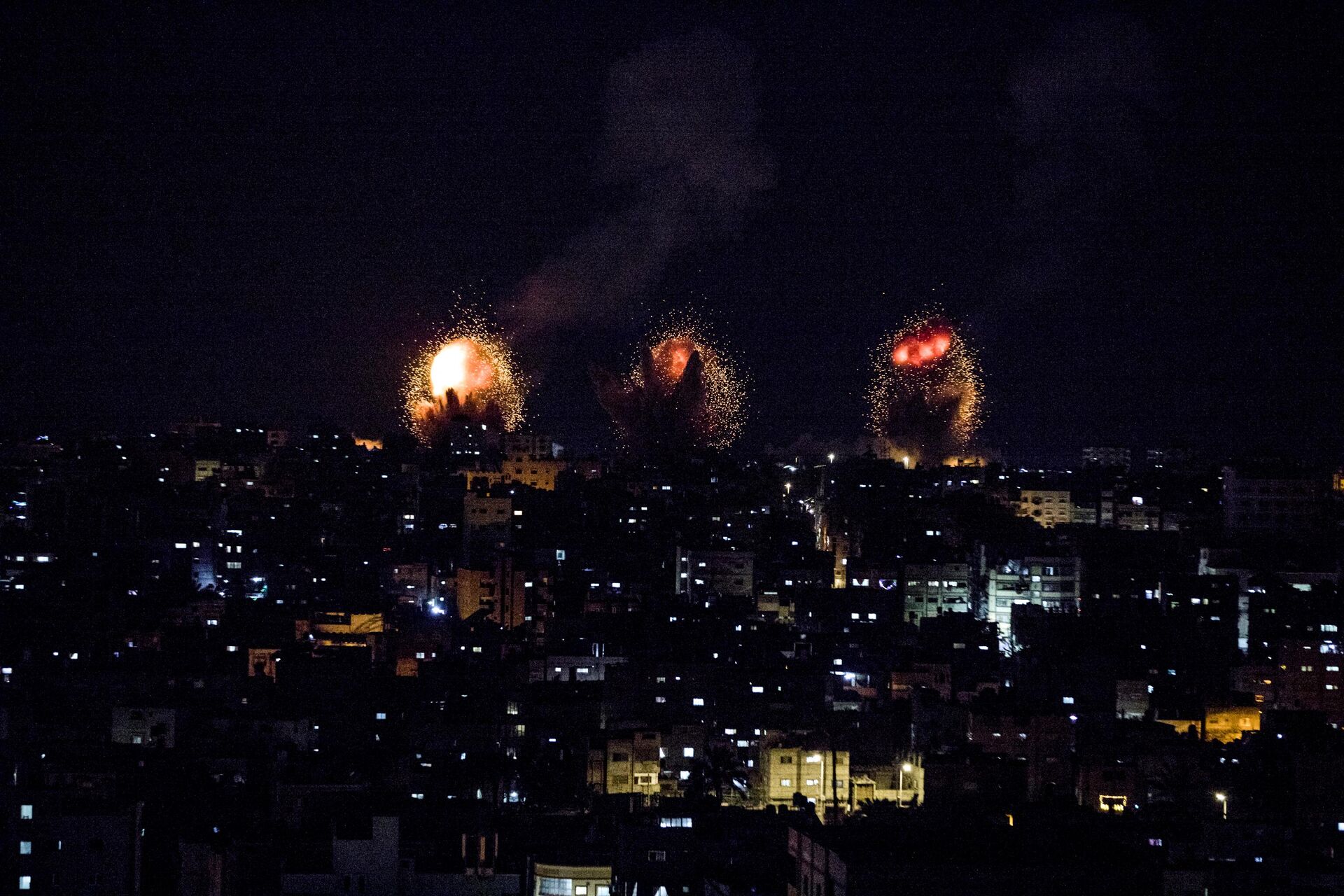
This picture taken early on April 7, 2023 shows explosions in Khan Yunis in the southern Gaza Strip during Israeli air strikes on the Palestinian enclave.
© AFP 2023 / -
“The IDF will not allow the terrorist organization Hamas to operate from Lebanon and considers the state of Lebanon responsible for all fire from its territory,” the military noted.
Israel’s Prime Minister Benjamin Netanyahu warned earlier on Thursday that the Israeli government would be united in its actions against the state’s "enemies." After a security cabinet meeting, Israeli Defense Minister Yoav Gallant added that the country’s “defense establishment is prepared to face any threat, on any front."
How Lebanon Reacted to Israeli Strikes?
Lebanese authorities have condemned the Israeli attacks, describing them as a flagrant violation of Lebanon’s sovereignty.
Lebanese Foreign Ministry said that the country's mission to the UN would submit a complaint to the UN Security Council against the Israeli "bombing and aggression."
What Does Hamas Say?
Hamas, for its part, said in a statement that they “strongly condemn the blatant Zionist aggression against Lebanon." This was echoed by Lebanese Prime Minister Najib Mikati, who said that the government “categorically rejects any military escalation”, as well as the use of Lebanon to stage acts that threaten stability.
Hamas member Basem Naim has, meanwhile, told the Qatar-based broadcaster that people in Gaza have “no place to hide” and that rocket fire was a way for the enclave to defend itself from Israel.
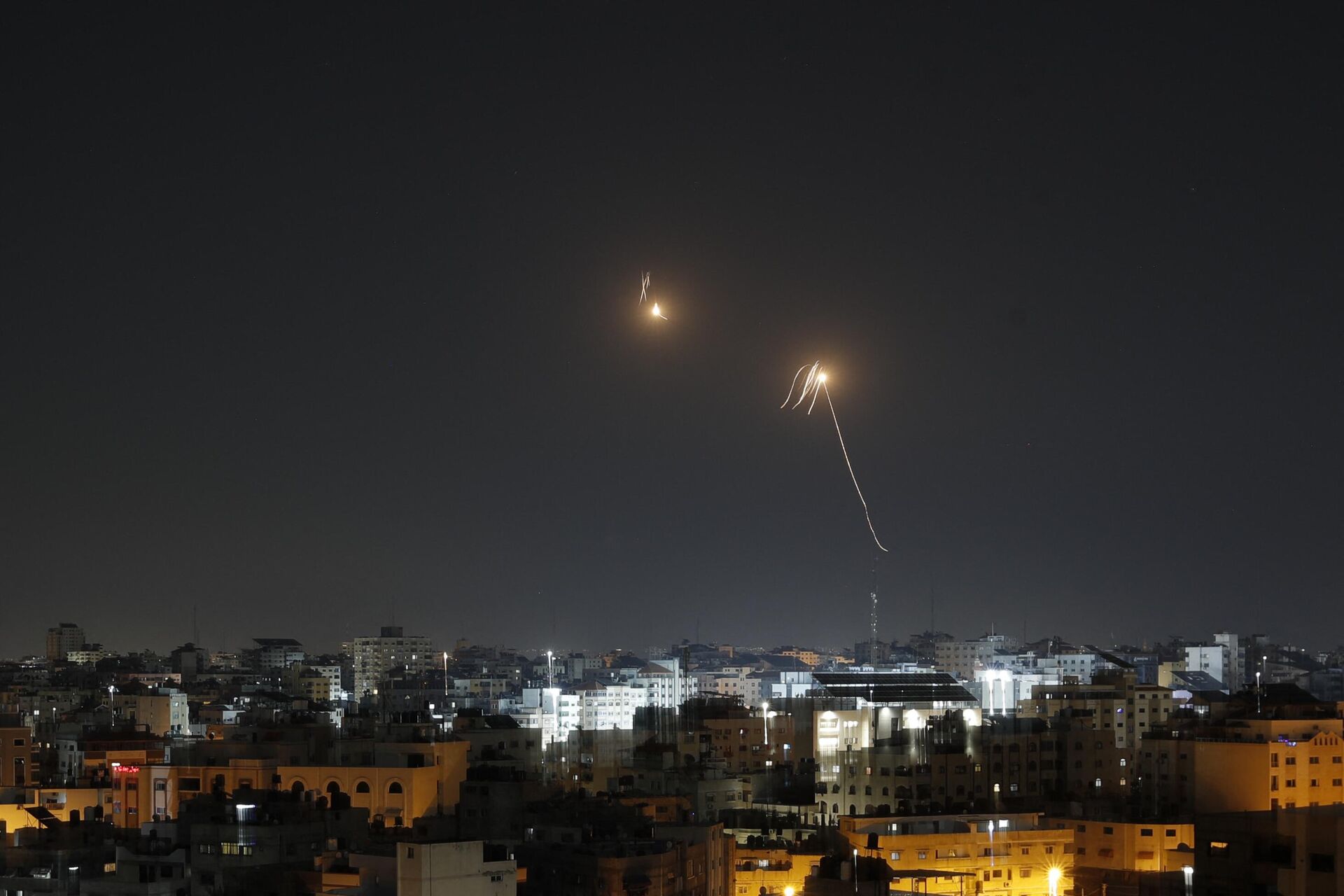
Streaks of light are seen as Israel's Iron Dome air defence system intercepts rockets fired from the Gaza Strip into Israeli territory on April 7, 2023.
© AFP 2023 / MOHAMMED ABED
What Does UN Peacekeeping Force Think?
The UN Interim Force in Lebanon (UNIFIL), in turn, has called for restraint.
“Both sides (Lebanon and Israel) have said they do not want a war. The actions over the past day are dangerous and risk a serious escalation,” UNIFIL said in a statement, adding that mission head Major General Aroldo Lazaro was speaking to authorities on both sides of the border.
What Fuelled Current Escalation?
The latest surge in tension followed fresh Israeli violence inside the Al-Aqsa Mosque in East Jerusalem on Tuesday, when dozens of Palestinians were injured during clashes with Israeli riot police who used stun grenades, gas, rubber bullets, batons and stocks of rifles.
Israeli police claimed in a statement that "several law-breaking youths and masked agitators" fortified the mosque allegedly "in order to disrupt public order and desecrate” the facility. “After many and prolonged attempts to get them out by talking to no avail, police forces were forced to enter the compound in order to get them out with the intentions to allow the Fajr [dawn] prayer and to prevent a violent disturbance. When the police entered, stones were thrown at them and fireworks were fired from inside the mosque by a large group of agitators," the statement added.
Prime Minister Netanyahu insisted that the police "had to act to restore order", adding, "Israel is committed to maintaining freedom of worship, free access to all religions and the status quo on the Temple Mount, and will not allow violent extremists to change this."
The Islamic Waqf, which administers the Al-Aqsa site, however, described the Israeli police's actions as "a flagrant violation of the identity and function of the mosque as a place of worship for Muslims alone".
It was echoed by Palestinian President Mahmoud Abbas's spokesman Nabil Abu Rudeineh, who condemned the raid, describing it as an attack on Muslim worshippers. "We warn the Occupation [Israel] not to cross the red lines in the holy places, which will lead to the big explosion," the spokesman said.
Hamas, in turn, called the incident "an unprecedented crime" and warned Israel that there would be "consequences."
Palestine Center for Prisoners Studies director Riyad Al-Ashqar, for his part, told journalists that the Israeli forces detained over 200 Palestinians during the raid, which reportedly left at least 50 Palestinians injured.
Following the clashes, at least 16 rockets from Gaza and 34 more from Lebanon were launched on Israel, triggering sirens in communities located in the Jewish state’s southern areas.
What is Al-Aqsa Mosque?
The al-Aqsa Mosque, the third holiest site in Islam, is located on a hill known by Muslims as al-Haram al-Sharif (the Noble Sanctuary) and by Jews as the Temple Mount, which is regarded as a holy place by Muslims, Christians and religious Jews.
The 14-hectare (35-acre) compound houses the al-Qibli Mosque and the Islamic shrine Dome of the Rock.
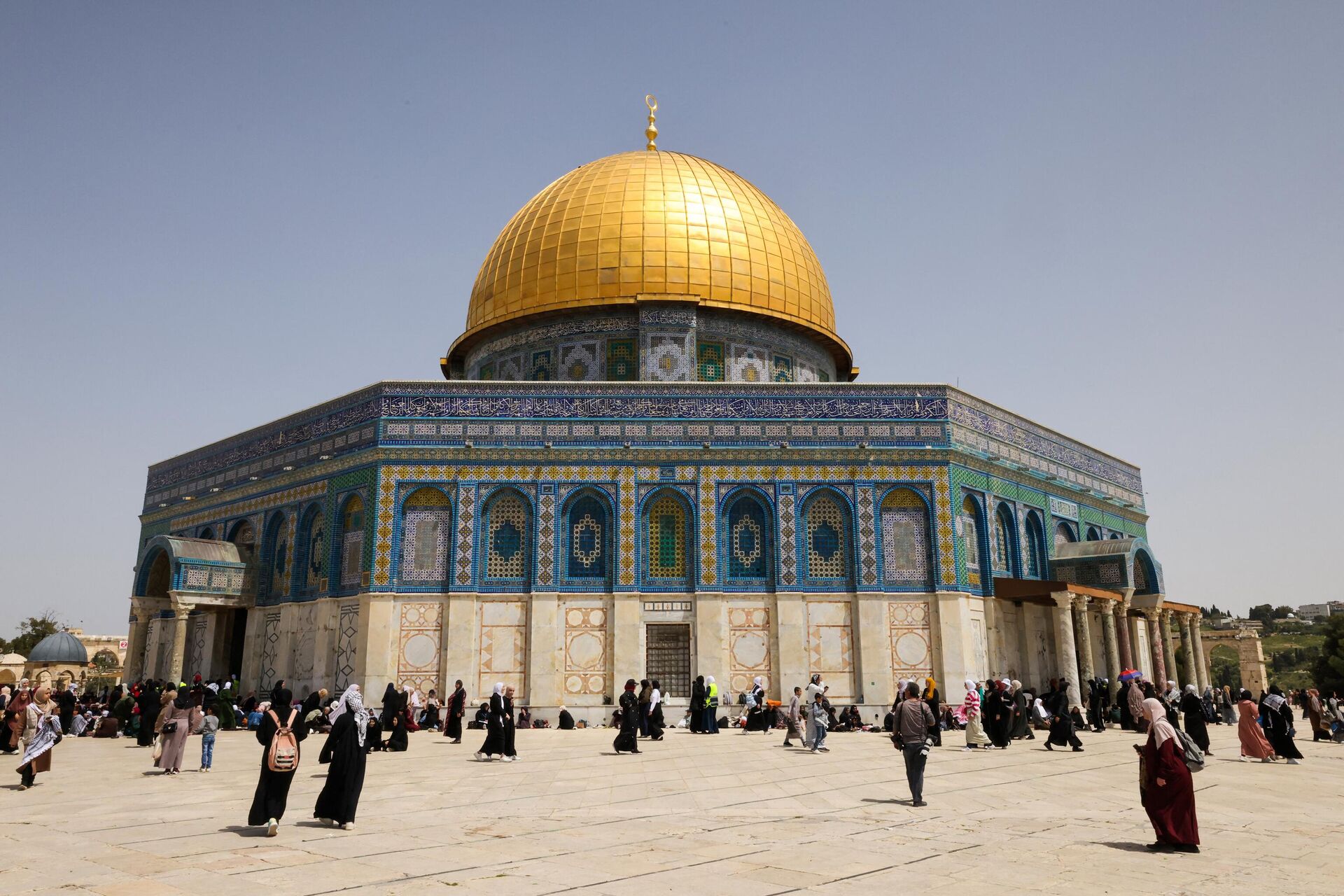
Palestinian Muslim devotees gather at the compound of the Al-Aqsa Mosque ahead of the third Friday Noon prayer during the Islamic holy month of Ramadan in Jerusalem on April 7, 2023
© AFP 2023 / AHMAD GHARABLI
The clashes over the status of the complex have been going on for a long time, since the hill it sits upon is considered holy both by Muslim Palestinians and by Jews.
Palestinians have repeatedly accused Israel of hindering their access to the Al-Aqsa Mosque and allowing large numbers of Jewish visitors to the site under police escort, claiming it is a violation of the present agreements on the site between the two sides.
Al-Aqsa Mosque-related tensions in May 2021 prompted Hamas to fire scores of rockets towards Jerusalem, triggering an 11-day conflict with Israel, which claimed the lives of at least 256 Palestinians and 13 people in the Jewish state.
Two-State Solution
The two-state solution is a proposal championed by the United Nations, which is meant to peacefully resolve the Israeli-Palestinian conflict and perhaps create a foundation for lasting peace in the Middle East.
This plan envisions the creation of a Palestinian state that will peacefully coexist with the existing state of Israel.
Relations between Israelis and Palestinians remain volatile since Israel’s creation back in 1948.
While Palestinians seek to secure recognition of their state that would exist on the territories of the West Bank (including East Jerusalem) and the Gaza Strip, Israel simply does not regard the Palestinian Authority as an independent political and diplomatic entity and continues building settlements on the lands that Palestinians consider their own.

